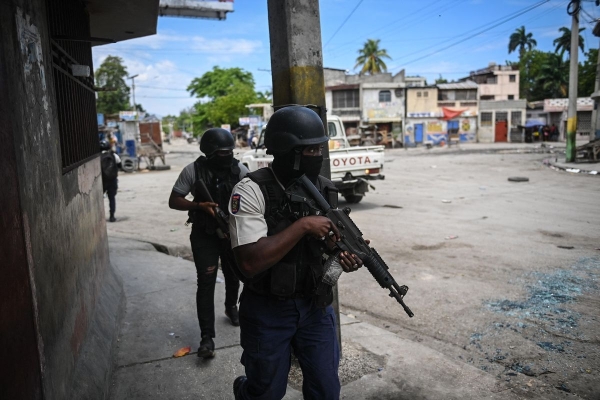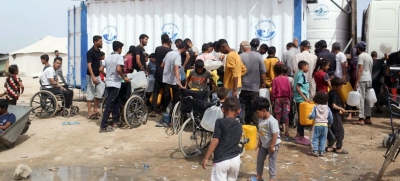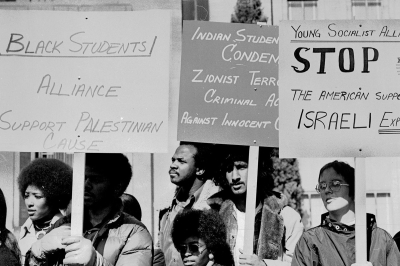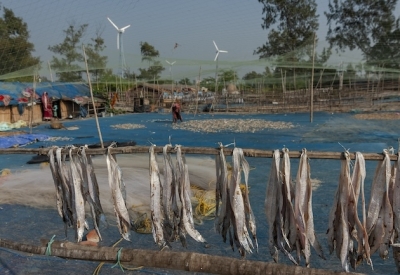Once again, the international community will intervene in Haiti, this time to stabilize the security situation in the capital of Port-au-Prince, where gangs have terrorized civilians for the past two years.
The United Nations Security Council passed a resolution Monday authorizing a multinational security mission — led not by UN peacekeepers but by Kenya’s national police force — to tackle gang-related violence. Following the assassination of Haitian President Jovenel Moïse in 2021, several armed groups, mostly under the banners of the gang federations of G9 and G-PEP, effectively took control of the capital — trafficking drugs, extorting and kidnapping ordinary citizens, recruiting children, and raping and murdering both their enemies and innocent civilians alike.
A number of stakeholders agree that an intervention is critical to stop the violence, and given that the Haitian National Police force is outgunned and underpaid, it has to be an external force of some kind. But given the sometimes-grim history of international security missions in Haiti (including creating one of the worst cholera outbreaks in modern times), a longer history of imperial and colonial interference, and a lack of investment in Haiti’s governance structure and economy, there is also real fear about the long-term effects of another such intervention.
Complicating all of this is Haiti’s political situation. Following Moïse’s assassination, Ariel Henry — a neurosurgeon who was awaiting appointment to the prime ministership — took control of the government. In his capacity as head of state, Henry has presided over a rout of Haiti’s governmental institutions (such as they were). He’s also allowed gang violence to proliferate to the point that it has effectively cut off Port-au-Prince from the rest of the country.
“It’s as bad as it’s ever been,” Keith Mines, the director of the Latin America program at the US Institute of Peace, told Vox.
Most Haitians outside of the elite and political class do not consider Henry the legitimate leader, experts said. But the United Nations and the international community, including the United States, recognize Henry, prompting yet another concern about this intervention: that it will ultimately serve Henry — not Haitians.
What would this international intervention look like?
Kenya’s national police force has stepped up to lead the current proposed intervention, pledging to send 1,000 officers to assist and train Haiti’s own police force. Several Caribbean countries will also provide officers or potentially troops, and US Assistant Secretary for Western Hemisphere Affairs Brian Nichols indicated there were offers of support for the mission from countries in “Asia, Africa, Latin America, [and] the Caribbean” in a September press conference.
The Multinational Security Support mission, or MSS, will be deployed for a year, with a review after nine months, according to the Associated Press. Alfred Mutua, Kenya’s minister of foreign and diaspora affairs, told the BBC that he expected to have boots on the ground by the first of the year. He also expects the mission to train Haitian officers, patrol with them, and guard specific sites like ports, the New York Times reported. Experts have said the focus will have to be on working with the Haitian police to identify gang structures, funding streams, and more to be able to effectively tackle one of the worst gang violence issues the country has faced.
Gang violence has long been intimately entwined with Haitian politics, from the Tonton Macoutes under former dictator François “Papa Doc” Duvalier to Aristide’s Chimères. But under Henry, the armed groups have taken advantage of a political vacuum and gained brutal power over everyday life in Port-au-Prince.
In the past, “the gangs had some ties with political movements, not only because they had arrangements for the elections and something like that, but also because of a shared ideology,” explained Diego da Rin, a researcher with the International Crisis Group. They “have acquired a great amount of independence over the last three years. And now they are not talking to members of the elite as sponsors, but rather as partners.”
Kenya might seem an unlikely country to lead this intervention. Mutua has framed it as part of Nairobi’s “commitment to Pan Africanism,” as well as “reclaiming of the Atlantic crossing.” But it’s unlikely this would have happened without other countries’ involvement.
Though the US has supported an international intervention since Henry began calling for it last October — and pledged $100 million toward the effort at September’s UN General Assembly — there’s no appetite on the US side to lead such a mission. The US tried to pressure Canada’s military into leading a security operation last fall (Canada would have soldiers who spoke French, one of Haiti’s official languages, and had participated in peacekeeping operations there before). But Canada, too, was reluctant to put boots on the ground given its commitments in Ukraine and the challenges of its previous role in the United Nations Stabilization Mission in Haiti (known by its French acronym MINUSTAH) from 2004 to 2017. Other regional leaders, like Brazil, were also reluctant to take the lead on an intervention.
Then, this July, Kenya announced it would do so.
HAITI
— . . (@DrAlfredMutua) July 29, 2023
At the request of Friends of Haiti Group of Nations, Kenya has accepted to positively consider leading a Multi-National Force to Haiti. Kenya’s commitment is to deploy a contingent of 1,000 police officers to help train and assist Haitian police restore normalcy in the… pic.twitter.com/CBwIlAOSyd
“Kenya has recognized and increasingly sees value in regional security partnerships and regional security engagements more generally,” Joseph Siegle, research director at the Africa Center for Strategic Studies, told Vox in an interview. Kenya has been part of an African Union peacekeeping force in Somalia since 2011 to help combat the al-Shabaab insurgent group in the country. That effort has yielded mixed results, though, and many news reports have pointed to the Kenyan National Police force’s track record of human rights abuses within Kenya as cause for concern, particularly in a hostile environment like Haiti.
Over the past few weeks, Kenya has ramped up its diplomatic efforts with both the US and Haiti; the East African nation signed a defense agreement with the US that will provide resources for Kenya’s fight against al-Shabaab, as the AP reported last week. Kenya and Haiti also established diplomatic relations in September.
Will this be different from previous international interventions? That’s a good question.
Since Haiti’s independence, wealthy nations have meddled in the island country to its detriment. But, as Jake Johnston, a senior research associate at the Center for Economic and Policy Research, told Vox, “It’s not always the same, and the interventions we’re talking about now — it’s not the same as the early 20th century US occupation, or France sending gunboats off the shore in the early 19th century.”
Still, more recent peacekeeping efforts have a checkered past as well. Though they may have succeeded in stabilizing Haiti in the short term, they have failed to bring lasting stability and peace to the country and in some cases contributed to destabilization.
In 1994, a US-led UN peacekeeping mission deployed to Haiti following a 1991 coup, which overthrew the democratically elected Jean-Bertrand Aristide. Mines, who was part of that mission, argued that “the interventions have been, often, the only thing that resets a government in Haiti so that it could function and people [could] eat again.”
“It created the foundation for a very, very, very long process of democratic consolidation,” he added. “That is a long process, particularly for a country like Haiti, whose total civil society had been destroyed.”
But whatever democratic consolidation successfully occurred over that mission and the peacekeeping period that followed through 2000 later collapsed, partly due to the economic strain of international sanctions and alleged corruption after Aristide’s return to power. He fled an armed uprising in 2004, and once again UN peacekeeping forces came to calm the violence that broke out between Aristide’s opponents and his supporters.
Peacekeepers on that mission — which lasted for over a decade — were likely responsible for a cholera epidemic that began in 2010 after the disastrous earthquake, killing 10,000 Haitians and sickening hundreds of thousands more. That incident, according to a 2016 report from then-Special Rapporteur Philip Alston, provided “highly combustible fuel for those who claim that UN peacekeeping operations trample on the rights of those being protected, and it undermines both the UN’s overall credibility and the integrity of the Office of the Secretary-General,” the New York Times reported.
Sexual abuse and exploitation were also an issue during that UN peacekeeping mission, though it’s not unique to Haiti, according to a 2020 Human Rights Watch report. Sri Lankan peacekeepers have been accused of heinous sexual abuses in Haiti, including hundreds of allegations of sexual abuse and exploitation of children , going back as far as 2007, the Associated Press reported in 2017.
It’s too early to know what oversight for the present security mission will look like. A State Department spokesperson told Vox via email that “we continue to prioritize the protection of human rights, and the promotion of accountability for MSS personnel, in conversations with international partners on the Multinational Security Support mission.”
But the big question is: Will this actually work?
Even if this intervention can somehow mitigate gang violence and stabilize Port-au-Prince, it will do nothing to address a parallel crisis: the government’s lack of political legitimacy.
Henry took over as acting prime minister and acting president of Haiti on July 20, 2021, 13 days after Moïse’s assassination. At the time of his death, Moïse had chosen Henry as his next prime minister but Claude Joseph was still technically in the position, creating confusion about who would lead the country. Joseph initially took over leadership of the government, but quickly stepped down in favor of Henry. Over the next half year, doubts developed about Henry’s commitment to seeking justice for Moïse’s assassination.
In the two-plus years of Henry’s leadership, not only has the immediate crisis of the gang violence grown worse, but he has also enabled the hollowing out of Haiti’s institutions. The judiciary — though it was dysfunctional before Henry’s leadership — is largely unable to prosecute gang-related and corruption crimes, and the terms of Haiti’s last remaining senators expired in January, leaving the government with no elected officials, as Henry indefinitely postponed parliamentary and presidential elections in 2021.
And right now, that doesn’t look like it’s going to change. There’s no political agreement for Henry to step down or for Haitians to install a transitional government to go along with it.
That’s not to say that a framework doesn’t exist; in fact, there are multiple frameworks. Two hold particular promise: the Montana Accord and the December 21 Accord, two proposals designed by cross-sections of Haitian society over the last two years.
The Montana Accord provides a roadmap “to create the conditions for national stability with a view to a return to constitutional normality and the restoration of democratic order” over a period of two years. It proposes a National Transitional Council, composed of members of civil society organizations and political parties, which would choose and oversee transitional leadership. Within a month, the leadership would establish an independent body to hold elections. The framework also addresses the matters of constitutional changes and justice and accountability for the perpetrators of the current crisis. It also provides for needs like education, health care, and public safety. The Montana group even chose its proposed leadership in 2022, but negotiations between Henry and the group stalled in August 2022.
The December 21 Accord, negotiated after the Montana Accord stalled by a group of political leaders, civil society actors, business sector leaders, and Henry, is also a potential transitional framework, as Mines discussed in a March blog post. Henry, as part of the agreement, was supposed to hold elections this year, for a new government in February 2024, but there’s no indication that he’ll actually do that.
Thus far, however, the US and the UN have effectively treated Henry as Haiti’s legitimate government representative, which isn’t a view most Haitians, either in the country or in exile, share. That contributes to the perception among some constituencies that a security mission will only entrench Henry’s power.
“Henry has been the sole leader, the executive, for over two years,” da Rin said. “He has ruled without any oversight or control from the judiciary or the parliament that ceased completely to exist in January of this year, when the last elected officials’ mandate expired. So it is really necessary to have a more legitimate government, to have a legitimate interlocutor with the international community and for Haitians to not believe that the … security mission won’t be helping only to consolidate his power.”
But the lack of a political solution shouldn’t preclude an intervention, Rep. Sheila Cherfilus-McCormick (D-FL), the first Haitian American Democrat elected to Congress, told Vox in an interview. “When you see people who are suffering, living in atrocities and violence like we’ve never seen before in Haiti asking for help, who are we to say, ‘No, we don’t want to help, we’re not going to send peacekeepers to fight the gangs,’” she said. “The more we wait, the more lives we risk.”
Cherfilus-McCormick insisted that Henry must step down, though, and that the US has a role to play in that process. “The [Biden] administration does need to go a step further and no longer support [Henry] and support the transition government. There are civil society members who have come together and who have private sector support, who can compose this transition government,” she said. “So why aren’t we supporting them?”
A State Department spokesperson told Vox in an email that the security mission “will not support any political leader or party. It will strictly focus on improving security in Haiti, answering the call from across the Haitian government, private sector, and civil society” and that the Department of Defense will assist with “logistics, equipment, billeting, basing, airlift, communications, and medical support.”
Details about additional humanitarian support — food and fuel for people in Port-au-Prince, medical care, and other critical aspects of everyday life — remain scarce for now, and it will be months before the multinational force has the necessary training, equipment, and cohesion to start its specific mission in the first place. But even though that aspect of stabilizing the country is just getting underway, it’s unclear how far into the future various stakeholders have thought about their decision.
“You can’t send troops in there and combat gangs and think that that’s actually addressing the drivers of instability and insecurity,” Johnston said. “And so what’s your plan? Are you going to occupy Haiti forever with foreign troops to prevent any instability? I don’t think so.”






